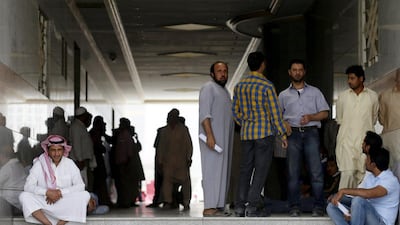Scores of workers gathered outside an office of one of Saudi Arabia’s biggest construction companies on Tuesday to demand unpaid wages, as low oil prices and government austerity steps pressured the industry.
The workers, many from India, Pakistan and Egypt, scanned lists of names taped to a wall of the Saudi Binladin Group facility, checking whether they had been chosen to receive wages which, they said, had not been paid for up to seven months.
Binladin prospered during Saudi Arabia’s economic boom in the past decade, employing around 200,000 workers as it built many of the kingdom’s flagship infrastructure projects, including airports, roads and skyscrapers.
But like many other Saudi construction firms, it has been hit hard in the past year as low oil prices have prompted the government to slash spending in an effort to curb a budget deficit that totalled nearly $100 billion last year.
Sources familiar with the company told Reuters last November that Binladin planned to cut about 15,000 staff. Some of the workers who remain have been petitioning the company for months to be paid.
“Every day we come here. They say ‘come tomorrow, come next Sunday’. They tell me to be patient,” said Ramadan al-Sayed Ahmed, an Egyptian electrician, adding that he had not been paid since November. “I take money from friends in order to eat.”
Jeddah-based Binladin did not respond to an emailed request for comment from Reuters.
The company has had a series of pay disputes with workers this year. According to documents seen by Reuters, representatives of unpaid workers, the Saudi labour ministry and Binladin, as well as a local police representative, reached an agreement on one dispute in the city of Mecca earlier this year.
Under the deal, workers for a railway project handled by Binladin could stay with the company and get paid, leave the country with the money owed to them, or transfer to another company in Saudi Arabia and receive their money, the documents showed, without specifying when payments would be made.
Tuesday’s gathering in northern Riyadh took place near the construction site for the $11.6 billion King Abdullah Financial District, a glitzy district that is to house Saudi Arabia’s stock exchange as well as banks and multinational corporations.
Binladin is responsible for a large portion of the project, but the labour disputes appear to have interfered with construction as some unpaid workers have stopped showing up.
While state spending cuts have hurt the company, it has also struggled since King Salman suspended it from receiving new public contracts last September, after the collapse of one of its cranes killed over 100 people in Mecca.
Binladin has been discussing how to manage its debts with banks and a few have agreed to refinance some debt through steps such as extending maturities, with some providing short-term financing for the company’s working capital including staff wages, the sources said.
business@thenational.ae
Follow The National's Business section on Twitter

